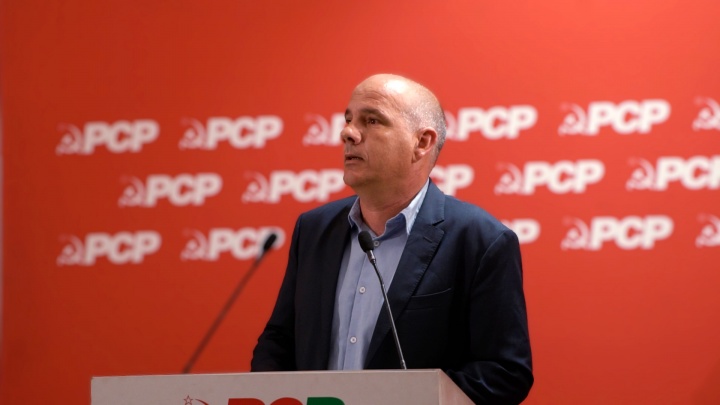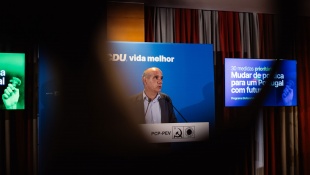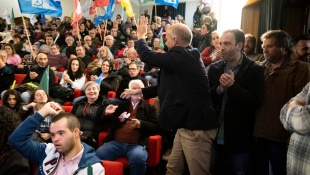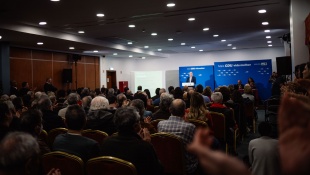Here we are holding our parliamentary conference in Serra da Estrela. Yet another opportunity to talk about the problems that the workers, the people and the country face, at the national level, but also in the districts of Castelo Branco and Guarda.
And, more than the problems, the solutions, in districts that have registered a sharp loss of population in recent years.
It is important to make it clear that desertification and demographic deficit are not inevitable, it is necessary to create the conditions for people to live in the Interior. It is no use using the argument that there are few people to justify the closure of public services, when it is precisely the right-wing policy that causes the population to leave the Interior of the country, because they lack conditions to stay here.
Because if the path is deindustrialisation, cuts in support for family farming, closure of schools, maternity hospitals and healthcare units, GNR National Guard stations, CTT Postal stations and offices, elimination of parishes and the resulting distancing between elected bodies and the population, maintenance of tolls, reduction and elimination of bus routes, lack of investment in the railways, why the crocodile tears and hypocritical lamentations about desertification?
We reject the assumption that the Interior is doomed. It is not and we do not accept that they doom it.
Let us defend and strengthen public services, instead of disinvesting and privatising. The services and strategic sectors must be placed at the service of the People, not of the economic groups and their shareholders that squander the resources that should belong to everyone in order increase their profits.
Let’s really invest in the National Health Service, instead of continuing to transfer public money to the business of disease, around 40% of the health budget, which is sorely needed by the NHS and its hard-working healthcare professionals and committed to the public cause and who, despite all difficulties, make the NHS what it is and a fundamental pillar that must be respected and valued. It is urgent to oppose this disinvestment and the logic that is well known here, of merging and aggregating healthcare services that effectively leads to the loss of capacity and medical services.
Let’s really invest in Education and Public Schools, respect and value its professionals. It needs the recognition of the time of the frozen careers of teachers, 6 years, 6 months, and 23 days, as the teachers point out with a very expressive struggle. In Higher Education, 53% of teachers are precarious. Of the 20,000 precarious teachers with more than 3 years of service, the government only undertakes to hire half. The government's lack of response to the just demands of the teachers is a political option with serious consequences for the lives of these workers, but also for the way in which the end of this school year and the beginning of the next will take place and for the future of public schools.
Let’s move from words to actions and really invest in Science and Research. It is necessary to put an end once and for all to the precariousness that rages among thousands of researchers. Contrary to what the government says, this in fact kills and dooms Science.
Let’s invest in agriculture and farmers, not big agribusiness. It is urgently necessary to oppose the policy pursued by the PS government, which is behind the 11.2% reduction in farmers' incomes in 2022 and the worsening of the agri-food balance deficit by 50%.
Let’s create Administrative Regions, once and for all, respecting the principle of administrative decentralisation. Let’s go ahead, once and for all, with Regionalisation, instead of transferring to local government responsibilities in areas of competence that it is up to the State to ensure.
Let’s give Local Government the means it needs, and that the Constitution enshrines, so that it is more capable of intervening to solve the problems of the populations.
Let’s improve the living conditions of the workers and people, let young people be provided with sufficient material conditions for them to take the step of constituting a family and let their rights be effectively exercised.
Measures that involve decent wages, permanent employment, good conditions and stable working hours, access to housing, daycare, schools, transport, access to healthcare services and monitoring of pregnant women and the right to be born safely in a public hospital. All fundamental conditions for choosing to have children and ensuring their education.
Measures that involve ensuring that children can grow up creative and critical, participative, and confident in their rights, not only because this is their right, but also because it contributes to the development and emancipation of all.
Measures like those that we have been demanding in all spaces and places, not wasting a single opportunity to try to make them see the light of day and become a reality.
It is with the creation of work with rights, with truly decent work, which values the workers. It is with the end of the expiry of collective bargaining and the restoration of the principle of more favourable treatment to the worker.
It is with a reduction in working hours that takes into account the evolution of science and technology and effective increases in productivity.
It is with the restoration of payment for overtime work or compensation for dismissal.
It is with effective contracts for all permanent jobs.
It is with freedom of trade union action in companies.
It is with the increase of wages and rights of those who work and have worked a lifetime and are faced with miserable pensions.
None of this is achieved, as can be seen, with government measures that they intend to portray as progressive agendas that, putting aside the sulks of employers, essentially serve their interests and protect the most grievous norms for workers in the labour code.
This is achieved with the strength of the struggle, as so many cases show us.
Of course, we do not cease to have proposals and present them in all circumstances. And in all of them, apart from dissents here and there, PS, PSD, IL, Chega and CDS converge to reject our proposals.
This was the case with the repeal of the expiry of collective bargaining; of the 35 hours for all workers; of the restoration of the principle of more favourable treatment for workers; of the repeal of the rule that presumes the acceptance of dismissal by accepting compensation; of the increase of the national minimum wage, among others.
This was and is the case in everything that implies workers' rights and wages, this was and is the case whenever the protection of the profits of economic groups comes ahead of the improvement of workers' lives, in the attack on public services, to create space for the business of private groups, in the attack on strategic sectors and the path of privatisation.
In 2022, around 70% of the jobs created were precarious jobs.
In Portugal workers work, on average, 41 hours a week. With over 350,000 workers typically working 49 hours or more a week in their main job, they make up 7.3% of all workers, above the EU average of 3.9%.
One million and 800 thousand workers, 44% of workers, work in shifts, at night, Saturdays, Sundays, and holidays, which results in increased difficulties in organising private life and reconciling professional and family life.
Three million workers, 70% of the total, earn less than a thousand euros gross per month, and 2 million people are in poverty, more than 300 thousand of whom are children.
This, while the main economic groups in Portugal had, in 2022, 20 million euros in profit per day and the richest 5% concentrate 42% of all the wealth created in the country.
In fact, it is political choices that determine persistence in the course we are witnessing. It is the right-wing policy that determines desertification, the demographic deficit, the closure of services, public disinvestment.
It is other options and another policy that will enable us to respond to problems. It is the patriotic and left-wing policy that will make it possible to increase income for those who work, tax capital, value and settle the population in the Interior, make having children an option and not a postponed dream.
Now that six years have gone by since the Pedrógão fires, and, shortly, since those that occurred in October 2017, here we are in Serra da Estrela, also ravaged by fires. If in 2017 more than 19,000 hectares burned in the Serra da Estrela Natural Park, last year, a fire burned 26,000 hectares.
Much is said about fires, many measures and support for the forest and its defence against fires are announced, but what is certain is that structural measures continue to be lacking.
In September last year we had the opportunity to present an Emergency Programme for Serra da Estrela.
A Programme that contains the necessary measures to respond to the critical situation resulting from the forest fires that have occurred, to ensure adequate planning and management of the territory integrated in the Serra da Estrela Natural Park and to reinforce the prevention and fight against forest fires.
A Programme that aimed to recover and valorise the Serra da Estrela Natural Park, in the environmental, social, and economic dimensions.
With emergency intervention in burned areas and defence and prevention of forest fires.
With identification of damages and losses and support scheme for the restoration of productive potential, loss of income and maintenance of agricultural and livestock activities, in particular with regard to the bordaleira breed of sheep, the production of Serra cheese and beekeeping.
By providing the Serra da Estrela Natural Park with an organic structure with its own management, linked to the territory and the populations, with the capacity to carry out the diagnosis of the state in which this protected area is found and to intervene in the sense of its recovery and valorisation, hand in hand with the population.
With the reinforcement of the capacity of the Institute of Conservation of Nature and Forest (ICNF) in human, technical and financial resources, to respond to the needs of management, recovery, inspection, and defence against fires.
This Programme was rejected, with the votes against by the PS, along with PSD, IL and PAN.
With regard to the drought we are experiencing, we know that it is far from being an unprecedented phenomenon.
In the last 10 years, only in 2014 did Portugal not register drought situations at the end of September.
With regard to last year, there was not a single month in which part of the national territory was not in a drought condition.
In September 2022, the entire national territory was in this situation, with 32% of the territory in a situation of severe drought. After autumn and winter, March 2023 arrives with about half of the national territory already in drought.
It is important to immediately ensure conditions for farmers and livestock producers so that all production is not lost, to safeguard the animals and to ensure the necessary income to maintain the activity.
Last Friday we tabled measures to this effect in the Assembly of the Republic, rejected with the PS voting against and the PSD, IL and PAN abstaining.
But there is still a need to adopt structural measures to ensure greater and more effective retention of winter water and to find mitigation and response solutions to increasingly frequent and severe drought conditions.
Last October, the AR discussed a bill by the PCP that provided for the creation of a National Plan for the Structural Prevention of the Effects of Drought and its monitoring.
In this bill, the PCP tabled the basic policies to respond to this problem that is getting worse in our country:
- creation of a programme to reinforce the storage capacity of water resources, which envisaged making a diagnosis of the drought situation throughout the country and the storage capacities;
- carrying out investments to increase this capacity and their interconnection;
- creation of a programme of adaptation for agricultural activities and another for agricultural and livestock activities.
- establishment of criteria in terms of authorising the use of water, ranking priorities of use, and subjecting any other uses to safeguard water availability.
We therefore proposed a concrete plan, with its own budget allocation, integrated in the management plans of the hydrographic regions.
This proposal was rejected, with PS and IL voting against and PSD and PAN abstaining.
Reinforcing the PCP, giving more strength to the PCP, is to reinforce the necessary, patriotic, and left-wing alternative, the solution to the country's problems, the improvement of the people's and workers' living conditions, sovereignty and development.
With determination, it is imperative to develop and expand the struggle in defence of workers, pensioners, young people, users. Of all those who feel the effects of right-wing policies firsthand. On the streets, in the workplace, in parishes, in municipalities, in the Assembly of the Republic, with the confidence and spirit of someone who always acts at the service of the workers and people and their interests and rights.
These parliamentary conferences are yet another contribution to this reinforcement.




